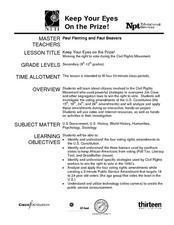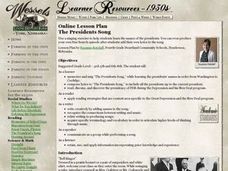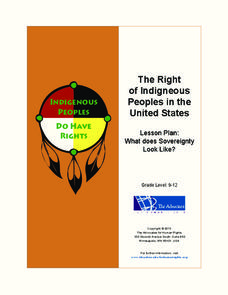Curated OER
The Gettysburg Address by Abraham Lincoln
"The Gettysburg Address" is the basis of a series of activities that not only model for learners how to conduct a close reading of a text, but also how a close reading can help them comprehend a difficult text. The detailed, step-by-step...
Missouri Department of Elementary
The Successful Student: Let’s Review for Better Achievement
Study skills, time management skills, and test taking-skills are important attributes for both the classroom and the real world. Focus on these learning skills in a lesson that reviews how to be a good student and make better grades.
Advocates for Human Rights
Undocumented Immigrants
Stay or go? As part of a study of immigration and human rights, class members listen to the stories of several immigrants and must decide if the story was their own if they would stay in the United States as an undocumented...
Constitutional Rights Foundation
Immigration Enforcement Raids
Class groups take on the role of advisors to the Assistant Secretary of the Office of Policy & Planning of ICE. Their charge is to prepare a report for the secretary on the effectiveness of enforcement actions of the ICE in...
Global Oneness Project
The Nature of Happiness
The U.S. Constitution states that the pursuit of happiness is an inalienable right. The United Nations' Global Happiness Index ranks countries according to the happiness of its citizens. As part of a discussion of the nature of...
The New York Times
Teaching the Vietnam War with Primary Sources from the New York Times
Use the New York Times database of primary sources to teach a unit on the Vietnam War. The resource consists of a variety of primary sources as well as a lesson plan showcasing how to teach a lesson using them. Pupils analyze the...
National Endowment for the Humanities
Revolution '67, Lesson 1: Protest: Why and How
To some people, protesting is as American as apple pie, but the factors that lead to protests can be as confusing to veteran activists as to today's youth. Revolution '67 explores the riots in Newark, New Jersey as a case study. ...
Curated OER
Susan B. Anthony Day
The history of women's suffrage and Susan B. Anthony are examined in this social studies lesson. Third and fourth graders participate in a simulation of a vote, develop slogans for women's suffrage, complete a KWL chart, write a tribute...
Advocates for Human Rights
Creating a Welcoming School and Community
The final activity in a unit study of immigration and human rights asks class members to design a project for their school that builds support for immigrant classmates. To prepare for this project, individuals use what they have learned...
EngageNY
Grade 9 ELA Module 3, Unit 1, Lesson 5
Ninth graders study the study of animals in an informational text lesson plan that focuses on analyzing text structure. As learners continue reading the first chapter of Temple Grandin's Animals in Translation, they form inquiries and...
Advocates for Human Rights
U.S. Immigration Policy
The United States Immigration Policy is incredibly complex. To gain a deeper understanding of the criteria, quotas, preferences, and categories of immigrants admitted to the US, class members engage in a role playing activity that...
Advocates for Human Rights
Civic Engagement and U.S. Immigration Policy
To conclude their study of immigration and human rights, class members create a civic engagement project centered on an issue of immigration and designed to influence US immigration policy. They examine examples of attempts to...
Alabama Department of Archives and History
Alabama's Secession in 1861: Embraced with Joy and Great Confidence. Why?
From December 20, 1860 to June 8, 1861, eleven states seceded from the Union. Alabama seceded on January 11, 1861. Why did so many white Alabamians want to secede? Why did they believe the South could win the war? These are the essential...
Advocates for Human Rights
Refugees and Asylum Seekers
To gain a deeper understanding of the plight of refugees and asylum seekers, class members read stories written from the point of view of an emigrant, map the individual's journey, and note the human rights affected by each stage of the...
Carolina K-12
Citizens United v. Federal Election Commission & the First Amendment
Should Congress limit how much a corporation spends to support a political candidate? Here is a fantastic lesson plan and activities to help young citizens approach this question.
Curated OER
The Colonization of the United States
Bring the Age of Exploration into the 21st century with this ancestry activity! Learners get a chance to explore the complex genealogy of the Spanish settlers through watching two video clips (approximately five minutes each) featuring...
Roy Rosenzweig Center for History and New Media
Immigrant Discrimination
For a class learning about Chinese and Irish immigration in America, here's a great starting lesson plan. It has your critical thinkers examining song lyrics, the Chinese Exclusion Act of 1882, and a political cartoon, and finally...
Curated OER
Keep Your Eye On the Prize
High schoolers learn about citizens who were actively involved in the civil rights movement, and the strategies they used to overcome the Jim Crow laws that were so prevalent in the 1960s. They investigate the voting amendments of the US...
Oakwood Publishing
Workshop 4: Constitutional Convention
How do new amendments become part of the US Constitution? AP government students explore, analyze, and use the US Constitution to develop a deep understanding of the interworkings of law and government while practicing synthesis and...
Curated OER
The Presidents Song
Remember learning to spell “encyclopedia” by singing along with Jiminy Cricket? How about using a singing exercise to learn the names of the presidents? “The Presidents Song,” includes the names, in order, from Washington to Coolidge....
Curated OER
Presidential endorsements: Newspapers decide
Twelfth graders collect, organize, evaluate and synthesize information from multiple sources in order to draw logical conclusions. They communicate this information using appropriate social studies terminology in oral, written or...
Advocates for Human Rights
The Right of Indigneous Peoples in the United States
The sovereignty of U.S. Native American nations is the focus of a resource that asks class members to compare the Right to Self-Determination in the UN Declaration on the Rights of Indigenous Peoples with a fact sheet that...
National Endowment for the Humanities
Lesson 4 James Madison: Internal Improvements Balancing Act—Federal/State and Executive/Legislative
Who has the power? The founding fathers asked the same question when the United States was formed. Learners explore issues that arose during Madison’s presidency that raised constitutional questions. Through discovery, discussion, and...
National Endowment for the Humanities
Lost Hero: Was John Hanson Actually the First President?
The first president of the United States was ... John Hanson? Scholars investigate the notion that the initial leader of the nation was not George Washington. Using research, articles, and open discussion, individuals create a quest for...























